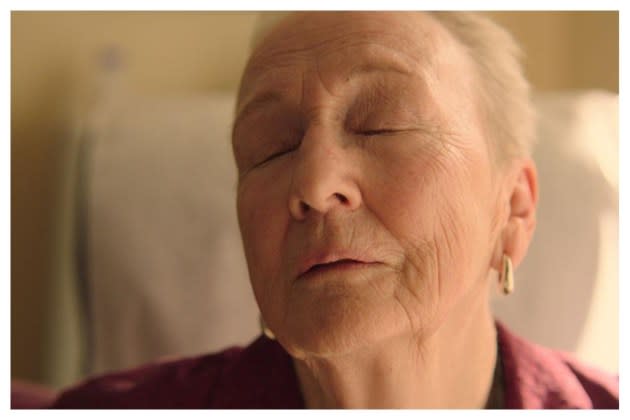‘Familiar Touch’ Review: An Exquisite Study of Living With Dementia That Puts Its Perspective In the Right Place

As late-life dates go, for octogenarian widow Ruth, it seems like a good one. The guy is younger, quite personable, and has an interesting job in sustainable architecture, even if she’s embarrassed to initially admit that she’s forgotten his name. She prepares them her favorite brunch — salmon and cream cheese on toast — before he takes her on a surprise getaway. Arriving at the hotel, the lobby looks polished and comfortable, though she’s thrown by the pacifying tone of the staff, and by her date referring to her as his mother. “I’m not a mother,” she clarifies. “I didn’t want kids.” It’s a moment of intense discomfort and acute tenderness — a fine balance that Sarah Friedland’s remarkable debut “Familiar Touch” sustains across a tight but searching 91 minutes.
As viewers will have surmised some time before Ruth (an extraordinary Kathleen Chalfant), she’s being checked into Bella Vista, an upscale assisted living facility not far from her bright, happily storied, memento-filled home in suburban Los Angeles, though it may as well be another world entirely. Her suitor is in fact her son, Steven (H. Jon Benjamin), who hands her over to the nursing staff with barely dry eyes that you just know will crack and flood the second he’s out of his mother’s view. And the move isn’t an ambush: Ruth is told she’s visited and even approved these premises before. Yet as she stares around her new, clean, impersonally beige room, she can’t help but feel her life has been hijacked, cast into a hostile unknown, however friendly the overtures of her new caregiver Vanessa (Carolyn Michelle).
More from Variety
'2073' Review: Dystopia is Inevitable in Asif Kapadia's Busy but Despondent Docufiction
Venice Competition Title 'Love' Sells to Further European Territories (EXCLUSIVE)
'Sudan, Remember Us' Review: Collective Hope Can't Be Crushed in an Exhilarating Documentary
Premiering in Venice’s Orizzonti sidebar — with a raft of festival appointments set to follow, and likely much distributor interest too — “Familiar Touch” is the latest in a recent surge of films, from “The Father” to “Relic” to “Dick Johnson is Dead,” to address the challenges and trauma of living with dementia. It’s a condition often treated on-screen in anodyne movie-of-the-week fashion, or evoked with disorienting levels of psychological trickery. But Friedland’s film takes neither approach: It’s a straightforwardly structured character study, humane but not sentimental, that stands out for the priority it grants to Ruth’s perspective throughout, presenting her not as a victim or a patient, but as the lucid, capable woman she still mostly feels she is.
As Ruth finds her bearings in Bella Vista, “Familiar Touch” begins to take on the contours of a fish-out-of-water story from an earlier stage of life — as if it’s a new school where the social rules haven’t been defined for her, and she can’t yet identify her allies from a daunting array of unfamiliar faces. She flickers in and out of awareness of exactly where she is, in some cases inventing coping strategies to avoid the vulnerable truth — as when she pointedly insists on addressing Vanessa and the resident physician Brian (Andy McQueen) as her “friends” rather than as helpers.
At other times, she regresses into the past entirely: An accomplished professional cook, she turns up at the facility’s kitchen as if for a shift at the diner she once ran, feeling most in control of her faculties with a chef’s knife in her hand. (For one morning, at least, her fellow residents enjoy the resulting breakfast upgrade.) And very occasionally, present-day clarity strikes, not always at opportune times: “Steve, he’s my son,” she exclaims abruptly one morning in the shower, with no one around to mark the lightbulb moment. “I won’t remember,” she says to herself, resigned.
With minimal exposition, Friedland’s perceptive, unfussy script draws a clear picture of what kind of woman, mother and wife Ruth was in her earlier years — which is to say, not far off the proud, nurturing, independent-minded woman she is now, though she’s repeatedly bemused by the failure of others to see her quite the same way. Vanessa, played by Michelle as a reassuring bastion of no-nonsense compassion, occasionally lets the professional mask slip as she regards Ruth with the piercing sadness of a daughter with her own parental problems to attend to. Ruth isn’t blind to the lives and feelings of others, even as she can’t quite piece them together into complete narratives outside her own.
Though it’s attentive to the occasionally mordant humor of memory loss and the indignities of aging, “Familiar Touch” never resorts to cheap “old people say the darnedest things” comedy, just as Chalfant’s performance never treats Ruth as either a stooge or a figure of tragedy. Most celebrated for her work in theater, the actor limns the character’s shifting states of consciousness with graceful precision, her face at times furrowed and her body tense with the effort of keeping her thoughts and words in line.
At other intervals, she physically brightens and slackens with relief as more intuitive emotions or sense memories come to her — youthful flashbacks washing over her as she floats in the therapy pool, accepts a tentative dance with her son, or is presented with recipe notebooks in her own handwriting. Friedland’s film, as sharp as it is soft, conveys both the terror of losing the life you recognize, and the intermittent, fragmented joy of finding it again.
Best of Variety
Sign up for Variety's Newsletter. For the latest news, follow us on Facebook, Twitter, and Instagram.
